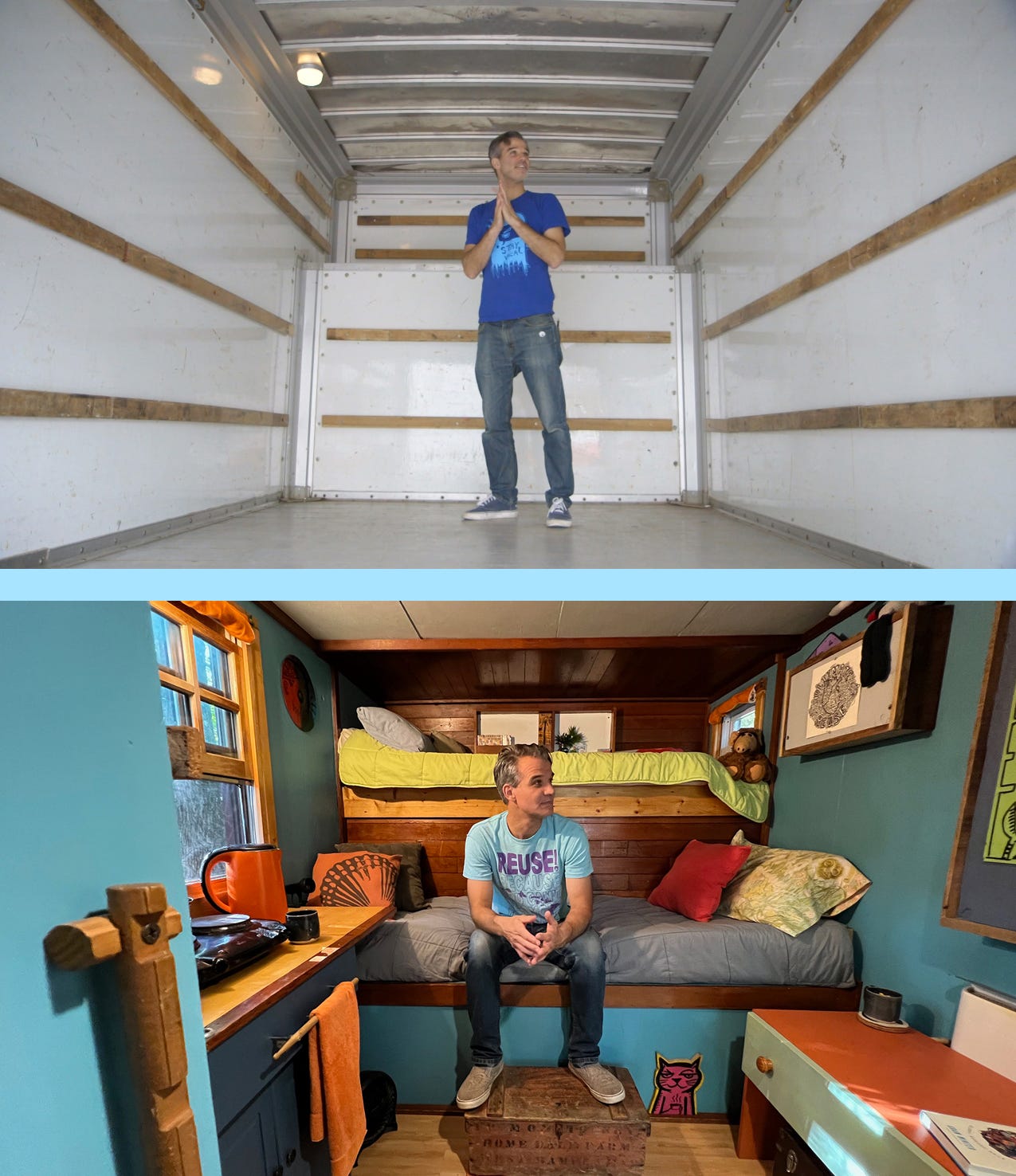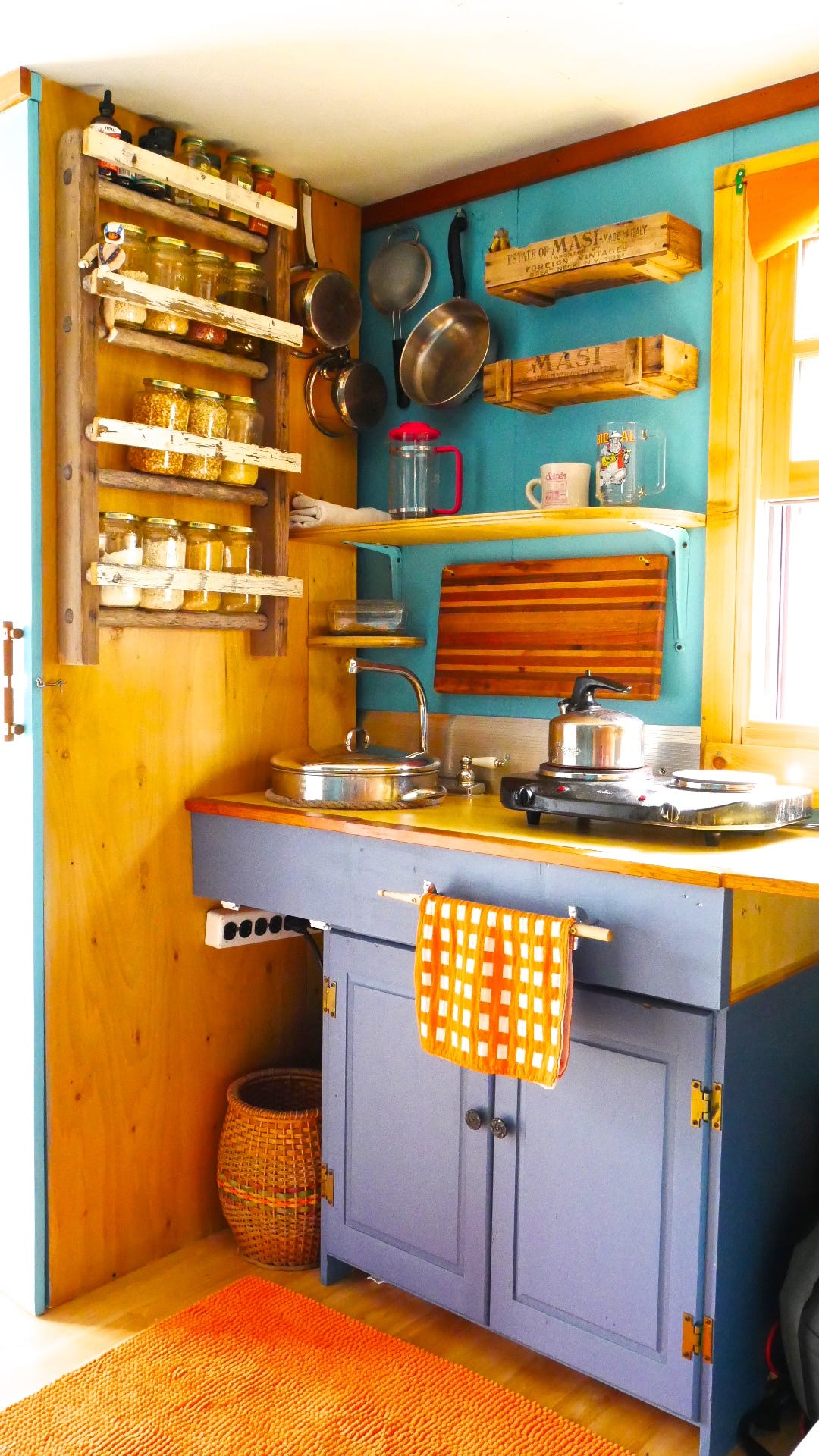Rolling in a Reuse(ful) Home on Wheels: An Interview with Material Reuse Artist and Mobile Educator Alex Eaves
Is the US ready for more creative approaches to housing? For some, the future is already here

I first learned about the work of material reuse artist and educator Alex Eaves via his documentary The Box Truck Film: Building A Reuseful Home (2022). I have been a follower of “cheap RV living” and related social media since researching different food truck practices at the height of the post-Great Recession movement; Jessica Bruder’s book, Nomadland: Surviving America in the 21st Century (2017), highlights the resourcefulness of many within the affordable homes-on-wheels community in the US—while also drawing attention to some of the challenges of navigating different urban environments not necessarily welcoming of modular or DIY housing approaches. Eaves and his colleagues add to the dialogue and encourage new thinking about transience, disposability and housing via their REUSE! Box Truck Tiny House, which serves as a mobile display. I had the chance to interview Eaves about his box truck home built from salvaged materials as he tours the country with it, and this is what he had to share:
What's an early memory that you have about material reuse in your life? What do you think inspires your work?
One of my earliest memories with material reuse was playing Matchbox cars with my Dad. He would make things like additional playsets by decorating used cardboard boxes and tunnels out of paper towel rolls, etc. What also inspires my commitment to reuse and reducing waste is just looking at the world around me. I want to leave this planet in good shape for future generations; I like to focus on the solutions, not the problems.
It’s also important to remember that what I do is fun! It shows that we can have our needs and wants met while saving resources and keeping things out of the landfill. This work can provide jobs and save money, while also helping to reduce pollution and climate impact.

What has it meant for you to reach so many about your work via major video streaming platforms?
I've been leading a passionate reuse life since 2007; my first film was released in 2015, and The Box Truck Film was released in 2022. When we announced that The Box Truck Film would be available via Amazon in 2023, suddenly it went from people saying, “wow, cool video” to “I just left you a review about your movie!” It certainly feels great to be recognized by major platforms and also to have a distribution company believe in our work.
The trailer for The Box Truck Film (2022) suggests that "our lives are full of waste: from the food we eat, to the clothes we wear, to the houses we live in.” Can you share more about how your work addresses these three particular areas of concern?
The majority of food in the truck is bulk foods kept in glass jars. By shopping this way, there is no packaging waste, and I'm also saving money. When I cook, I cook what I will eat and hardly ever toss anything out. Any food scraps go in my compositing toilet.

In regards to clothing, with the exception of items that I got before 2007, all of the clothes in the truck were preowned, vintage, or from my reuse clothing brand, STAY VOCAL. I personally haven't bought new clothing since 2008, and I stopped accepting new clothing gifts in 2010. My brand strictly prints only on pre-owned/used garments. One of the big education components of the brand is that it takes 713 gallons of water to grow the cotton for every new t-shirt.
In terms of housing, the entire box truck home is made with used materials. I used to travel in a small hatchback, but I wanted to show people how it is possible to live with waste reduction and reuse in mind. The truck includes maps that showcase what everything is and was to help further the education component.
You worked with friends and volunteers (Derek “Deek” Diedricksen and others) during the COVID-19 pandemic to create the box truck tiny house. What stands out to you about this project in 2025? Are you still using the truck?
Oh, I am definitely still using the box truck – in fact, I'm sitting in it right now! We're actually getting ready for our biggest event year yet with the truck; for example, we will be taking it to MIT! Longer term, I’m considering making the truck a more stationary educational piece, but for now it’s still on the road!

What has surprised you from engaging with the public via your different projects?
The most surprising thing to me has been how smart and receptive young kids are to this work. We had mainly been doing events at higher educational institutions and high schools, but then someone asked if we could bring the box truck to an elementary school, and that was a game changer for us. Deek [Diedricksen] and I have been amazed at the questions kids ask, and how they see the potential of reuse like this on a bigger scale. It gives us a lot of hope for our future.
Your work is influenced by environmental concerns but also artistic motivations and some economic interests. Can you talk more about your motivations?
I always talk about the three core benefits of reusing: it benefits our planet, it benefits people, and it benefits our wallets. What keeps me going is that there is a massive amount of stuff that we could keep out of the landfill and breathe new life into. I'm also a glass half full kind of guy –why would I just give up? Who else is going to do something? I want to leave this planet in good shape for future generations.
Do you think there is growing interest in or appetite for some of your ideas?
As someone who has been working in the reuse sector for over twenty years, the movement is certainly growing. More people are seeing that recycling as not a real solution to our waste problems, and that reusing is much more viable.
We're both getting older, but say you're still involved in creative and educational efforts in twenty years. What do you think might change by 2045?
Oh, wow! Firstly, I think that I have found my life's work – and I believe that I still will be involved in reuse edutainment in some ways in twenty years, whether I'm making films, leading talks, teaching classes, writing books, or running a coffee shop. What I'd like to be celebrating in 2045 is that reuse is commonplace again; reuse is not a new concept, and it’s something we need to go back to if we're going to survive and thrive as a planet. I'd like to see grocery stores be primarily bulk stores, coffee shops not have disposable cups, upcycled clothes by major brands, etc.

What do you think urban planners or governments could do to help address the kinds of waste issues that you focus on?
I'd like to see alternative housing and the repurposing of structures not only be more accepted, but easier for people to do. We hear a lot about the “housing crisis,” but I believe we're dealing more with a greed crisis and also a paucity of creativity. There are unfortunately a lot of towns and municipalities that are not accepting of tiny living or converted vehicles. In many cases, it's because people are afraid their traditional houses will be devalued because of these approaches. But imagine what we could do with all of the decommissioned schools buses, box trucks, airplanes, etc. We might not have an unhoused population.
What do you think schools and colleges could do to help?
One of the easiest and most effective solutions to reduce waste at any educational institution, I think, is to take on single-use food packaging waste; there are some great brands out there that work with schools to replace the single use trays, etc. with reusable solutions. Another concern is the incredible amount of branded merchandise purchased and sometimes discarded or stored by institutions. I recently worked with a college to restyle some of the hundreds of excess t-shirts that they had sitting in storage for years.
What's your dream collaboration?
I’ve always said that I'd love to get Shaquille O'Neal wearing an upcycled t-shirt – he’s like a superhero to me! I’d also love to collaborate more with my favorite band, 311 (who are also former employers as well as friends) – their music is in my first movie, and they've even visited the box truck tiny home project. And it would be great to collaborate with any stars active in the environmental world – Jack Johnson, Mark Ruffalo, Al Gore, etc.
Are there any projects or efforts that excite or inspire you?
Petaluma, California’s Reusable Cup Project is a pretty exciting to me! I definitely see this as something that could happen in more places!
If people want to get more involved with your work, what do you recommend?
In 2024, I launched a hub for all of my work with reuse called Escape The Waste. It's the home to my movies, my clothing brand and to endless reuse resources from around the globe. People can also reach out about hosting their own reuse events or consulting with me. The more we work together, the more positive change we can create, And no matter how people try to divide us, it's undeniable that we are all in this together.
Alex Eaves, the Founder and Director of Escape the Waste, has been successfully helping people combat the worldwide waste problem for over two decades by connecting them with reuse solutions.
Mark Tirpak is an adjunct / affiliate faculty member of Virginia Tech’s School of Public and International Affairs, as well as a guest instructor assisting Prof. Tom Sanchez at Texas A&M, College of Architecture, Department of Landscape Architecture & Urban Planning. Mark also serves as a member of the American Planning Association’s Trend Scouting Foresight Community.



